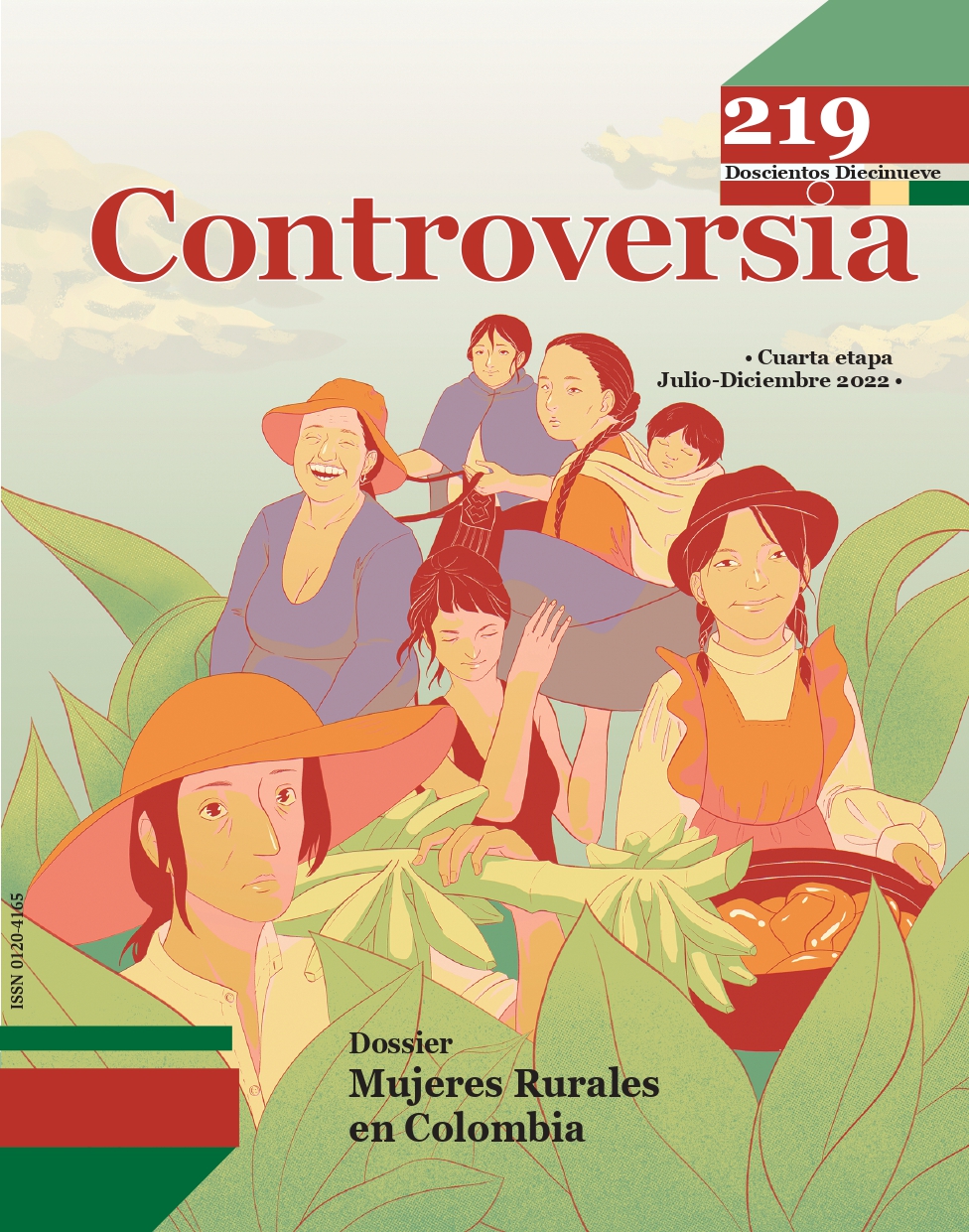Abstract
There is a heated debate taking place in Latin American feminist academia about the hegemonic feminism subject called ‘woman’ and the inclusion or exclusion of trans and non-binary people, gender diverse and plural bodies within the feminist refuge. This debate has not reached the field of rural and agrarian studies creating gaps in land access policies and essentialist analyzes that reproduce the binarism inside academy. It is believed that rural theory and gender theories differ mainly because its epistemological bases have different paths: one line focuses on material political actions and the other(s) start from discursive political actions, and what is called ‘merely identities reaffirmations’. However, in this text I raise some points to provoke a conversation and demonstrate that both epistemological lines are not so far apart and, from an epistemological base of transfeminist political action, I set an invitation to move the category 'rural woman' towards contemporary places of study, reality and concrete practices of alliance and solidarity

This work is licensed under a Creative Commons Attribution-NonCommercial 4.0 International License.
References
Amorós, Celia (Coord.). (1994). Historia de la teoría feminista. Instituto de Investigaciones Feministas.
Anzalduá, Gloria. (2016). Borderlands/La frontera. Capitán Swing.
Avendaño, Emily. (18 de febrero de 2021). Cronología del asedio al condominio de Riñimapu que terminó en tragedia. El Libero. https://ellibero.cl/actualidad/cronologia-del-asedio-al-condominio-de-rinimapu-que-termino-en-tragedia/
BBC News Mundo. (17 de octubre de 2019). Santuario, el inesperado refugio de indígenas trans en Colombia [Archivo de video]. Youtube. https://www.youtube.com/watch?v=ZxEkMGziyDU&ab_channel=BBCNewsMundo
Beauvoir, Simone de; López Pardina, Teresa y Martorell, Alicia. (2017). El segundo sexo. Cátedra.
Bernstein, Henry. (2010). Class Dynamics of Agrarian Change. Fernwood Pub./Kumarian Press.
Bonilla, Elsy y Rodríguez, Penélope. (1992). Fuera del cerco: mujeres, estructura y cambio social en Colombia. Agencia Canadiense de Desarrollo Internacional.
Braidotti, Rosi. (2015). Feminismo, diferencia sexual y subjetividad nómade. Gedisa.
Braidotti, Rosi. (2000). Sujetos nómades: Corporización y diferencia sexual en la teoría feminista contemporánea. Paidós.
Brass, Tom. (1990). Peasant essentialism and the Agrarian question in the Colombian Andes. The Journal of Peasant Studies, 17(3), 444-456.
Butler, Judith. (2018). Resistencias: repensar la vulnerabilidad y repetición. Paradiso Editores.
Butler, Judith. (2017). Marcos de guerra: las vidas lloradas. Paidós.
Corporación Caribe Afirmativo. (2021). Entre silencios y palabras. Libro V. Somos el vallenato que se canta bajito y todos quieren callar: conflicto armado y personas LGBT en Magdalena Medio y Cesar. Autor.
Deere, Carmen. (1997). Gender and Acces to Land in Colombia. Notebooks on Rural Development, (38-39), 7-23.
Deere, Carmen y León, Magdalena. (2000). Género, propiedad y empoderamiento: tierra, Estado y mercado en América Latina. TM Editores.
Deere, Carmen y León, Magdalena. (1986). La mujer y la política agraria en América Latina. Siglo Veintiuno.
Deleuze, Gilles y Guattari, Félix. (2002). Mil mesetas: capitalismo y esquizofrenia. Pre-Textos.
Díaz Suasa, Dora Isabel. (2002). Situación de la mujer rural colombiana: perspectiva de género. Instituto Latinoamericano de Servicios Legales Alternativos.
Farah, María Adelaida y Pérez, Edelmira. (2003). Mujeres rurales y nueva ruralidad en Colombia. Ponencia en II Congreso Iberoamericano de Estudios de Género, Salta, Argentina.
Federici, Silvia. (2014). La inacabada revolución feminista. Mujeres, reproducción social y lucha por lo común. Ediciones Desde Abajo.
Federici, Silvia. (2012). Calibán y la bruja. Mujeres, cuerpo y acumulación originaria. Traficantes de Sueños.
Gaard, Greta. (2017). Critical ecofeminism. Lexington Books.
Gago, Verónica. (2019). La potencia feminista, o, el deseo de cambiarlo todo. Traficantes de Sueños.
García Torres, Miriam; Cruz Hernández, Delmy Tania; Bayón Jiménez, Manuel y Vázquez, Eva. (2020). Extractivismo y (re)patriarcalización en los territorios. En Cuerpos, territorios y feminismos: compilación latinoamericana de teorías, metodologías y prácticas políticas (pp. 23-45). Abya Yala.
Gil, Silvia L. (7 de marzo de 2022). 8M Feminismos construyen un nuevo nosotras [Archivo de video]. Youtube. https://www.youtube.com/watch?v=ZZm63SxAhvk
Guattari, Félix y Rolnik, Suely. (2006). Micropolítica. Cartografías del deseo. Traficantes de Sueños.
Keller, Julie. (2014). Rural Queer Theory. In Feminisms and Ruralities, pp.155-166, eds. Barbara Pini, Berit Brandth and Jo Little. Lexington Books.
Lewis, Holly. (2020). La política de todes: feminismo, teoría queer y marxismo en la intersección. Bellaterra.
Mayor, Aingeru. (2021). Transfeminismo o barbarie. Kaótica Libros.
Merteens, Donny. (2017). Restitución de tierras, justicia de género y paz: reflexiones sobre el potencial transformador de la política rural en Colombia. Pontificia Universidad Javeriana/Instituto de Derechos Humanos y Construcción de Paz Alfredo Vázquez Carrizosa.
Miguel, Carmen y Villarreal, Norma. (2019). Protocolo de atención a mujeres rurales para el acceso a la justicia y a la tierra. Eurosocial.
Mohanty, Chandra Talpade. (2003). Feminism without Borders: Decolonizing Theory, Practicing Solidarity. Duke University Press.
Mortimer-Sandilands, Catriona and Erickson, Bruce (Eds.). (2010). Queer Ecologies: Sex, Nature, Politics, Desire. Indiana University Press.
Novoa Torres, Edgar A. (2006). Reseña de «Sujetos nómades» de Braidotti, Rosi. Revista Colombiana de Bioética, 1(2), 165-167.
Ojeda, Diana. (2022, enero). El punto ciego de la propiedad: género, tierra y despojo en América Latina. Trace, (81), 107-132.
ONU Mujeres. (14 de mayo de 2021). Juntas/os: resistiendo, apoyando, sanando!https://lac.unwomen.org/es/noticias-y-eventos/articulos/2021/05/feature-compilacion-voces-lgbtqi-activistas
Oywumi, Oyèrónke. (1997). The Invention of Women: Making an African Sense of Western Gender Discourses. University of Minnesota Press.
Serje de la Ossa, Margarita. (2005).El poder del contexto. En El revés de la nación: territorios salvajes, fronteras y tierras de nadie (1a. ed., pp. 45-76). Universidad de Los Andes,
Shiva, Vandana. (2004). La mirada del ecofeminismo. Polis, Revista Latinoamericana, 3(9).
Trejo Olvera, N. (2022, enero). Conversación sobre la cultura ballroom en Latinoamérica [Comunicación personal].
Trejo Olvera, Nivardo y Ruiz Tresgallo, Silvia. (2021). Los imaginarios disruptivos del cuerpo queer: un análisis de la masculinidad disidente en la ilustración mexicana del siglo XXI. Revista Interdisciplinaria de Estudios de Género de El Colegio de México, 7.
Valencia, Sayak. (2018). El transfeminismo no es un generismo. Pléyade. Revista de Himanidades y Ciencias Sociales, (22).
Valencia, Sayak. (2022, abril 4). Políticas post-mortem y resistencias transfeministas [Archivo de video]. Youtube. https://www.youtube.com/watch?v=xWHc5YdejGw



